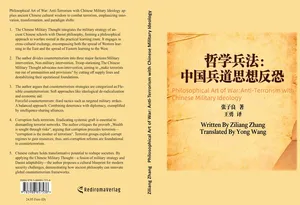
Beschreibung
Philosophical Art of War: Anti-Terrorism with Chinese Military Ideology applies ancient Chinese cultural wisdom to combat terrorism, emphasizing innovation, transformation, and paradigm shifts:
1. The Chinese Military Thought integrates the military strategy of ancient Chinese schools with Daoist philosophy, forming a philosophical approach to warfare rooted in the practical learning route. It engages in cross-cultural exchange, encompassing both the spread of Western learning to the East and the spread of Eastern learning to the West.
2. The author divides counterterrorism into three major factions:Military intervention, Non-military intervention, Troop-stationing.The Chinese Military Thought advocates non-intervention, aiming to „make terrorists run out of ammunition and provisions“ by cutting off supply lines and destabilizing their operational foundations.
3. The author argues that counterterrorism strategies are categorized as:Flexible counterterrorism: Soft approaches like ideological de-radicalization and economic aid.
Forceful counterterrorism: Hard tactics such as targeted military strikes.
A balanced approach: Combining deterrence with diplomacy, exemplified by intelligence-sharing alliances.
4. Corruption fuels terrorism. Eradicating systemic graft is essential to dismantling terrorist networks. The author critiques the proverb „Wealth is sought through risks“, arguing that corruption precedes terrorism—“corruption is the mother of terrorism“. Terrorist groups exploit corrupt regimes to gain resources; thus, anti-corruption reforms are foundational to counterterrorism.
5. Chinese culture holds transformative potential to reshape societies. By applying the Chinese Military Thought—a fusion of military strategy and Daoist adaptability—the author proposes a cultural blueprint for modern security challenges, demonstrating how ancient philosophy can innovate global counterterrorism frameworks.
1. The Chinese Military Thought integrates the military strategy of ancient Chinese schools with Daoist philosophy, forming a philosophical approach to warfare rooted in the practical learning route. It engages in cross-cultural exchange, encompassing both the spread of Western learning to the East and the spread of Eastern learning to the West.
2. The author divides counterterrorism into three major factions:Military intervention, Non-military intervention, Troop-stationing.The Chinese Military Thought advocates non-intervention, aiming to „make terrorists run out of ammunition and provisions“ by cutting off supply lines and destabilizing their operational foundations.
3. The author argues that counterterrorism strategies are categorized as:Flexible counterterrorism: Soft approaches like ideological de-radicalization and economic aid.
Forceful counterterrorism: Hard tactics such as targeted military strikes.
A balanced approach: Combining deterrence with diplomacy, exemplified by intelligence-sharing alliances.
4. Corruption fuels terrorism. Eradicating systemic graft is essential to dismantling terrorist networks. The author critiques the proverb „Wealth is sought through risks“, arguing that corruption precedes terrorism—“corruption is the mother of terrorism“. Terrorist groups exploit corrupt regimes to gain resources; thus, anti-corruption reforms are foundational to counterterrorism.
5. Chinese culture holds transformative potential to reshape societies. By applying the Chinese Military Thought—a fusion of military strategy and Daoist adaptability—the author proposes a cultural blueprint for modern security challenges, demonstrating how ancient philosophy can innovate global counterterrorism frameworks.
Artikeldetails
| ISBN | 978-3-98885-753-8 |
| Seiten | 460 |
| Genre | Technik/Sonstiges |
| Autor | Ziliang Zhang |
| Erscheinungsdatum | 14.04.2025 |
| Preis | EUR 24,95 |
Copyright © 2026 rediroma-verlag.de. Alle Rechte vorbehalten.





